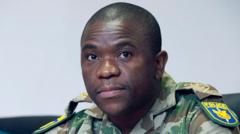Amidst turbulent relations with the Trump administration, South African President Cyril Ramaphosa exhibited calm and composure during a contentious meeting, reflecting on his diplomatic strengths. Despite domestic challenges, this encounter may bolster Ramaphosa's position and provide influence within the African National Congress.
Ramaphosa's Resilience in Face of Trump: A Turning Point for South African Politics

Ramaphosa's Resilience in Face of Trump: A Turning Point for South African Politics
South African President Cyril Ramaphosa, criticized and praised in equal measure for his diplomatic encounter with Donald Trump, may find renewed strength amid a fragmented domestic political landscape.
In a recent high-stakes meeting, South African President Cyril Ramaphosa faced a daunting challenge as he sat across from U.S. President Donald Trump, who reiterated discredited claims regarding a so-called "white genocide" in South Africa. Ramaphosa aimed to seek a boost in trade relations following strained ties between the two nations, but the encounter transformed into a globally broadcasted critique that tested his diplomatic mettle.
While some observers have praised Ramaphosa's composed demeanor in the face of Trump's aggressive assertions, others expressed disappointment at his perceived lack of an assertive response. This complex dynamic plays out against a backdrop of significant pressures back in South Africa, where the African National Congress (ANC) is entrenched in a fragile coalition government, grappling with widespread challenges such as economic stagnation, rising crime, and internal party discord.
The ANC’s coalition, formed in response to poor electoral outcomes, is currently strained over contentious legislative debates and policies affecting the country's vulnerable populations. With an internal power struggle brewing ahead of a pivotal 2027 conference, Ramaphosa's leadership is crucial for maintaining stability. Critics within the ANC, particularly from factions like the Economic Freedom Fighters, have intensified their calls for action against the government's handling of national issues, complicating Ramaphosa's political landscape.
The U.S.–South Africa trade agreement, known as Agoa, hangs in the balance, with potential non-renewal due to Trump's isolationist inclinations. Ramaphosa underscored the significance of U.S. investments for combating unemployment—a critical factor contributing to South Africa's high crime rates.
Despite the confrontation with Trump, there exists a silver lining for Ramaphosa: his performance has showcased his diplomatic prowess amid rising domestic discontent. His stability provides a counterpoint to the internal fractures within the ANC and could reinforce citizen support for his leadership. Analysts suggest that this episode might even enhance the standing of the coalition, presenting a united front and fostering confidence among South Africans eager for effective governance.
Critics like Julius Malema, vocal in their dissent, may attempt to capitalize on Trump's misstatements for their political gain. However, some analysts believe that Malema's radical approach lacks widespread support among a populace yearning for balanced governance rather than divisive rhetoric. The political calculations continue to evolve as South Africa navigates this turbulent period.
In closing, while Ramaphosa's encounter with Trump may not have yielded the trade gains initially hoped for, it could emerge as a pivotal moment in South African politics—highlighting his resilience and reinforcing his role as a stabilizing force in a fractured political environment. With his adept handling of international relations, Ramaphosa has potentially set the stage for a renewed focus on critical domestic issues moving forward.
While some observers have praised Ramaphosa's composed demeanor in the face of Trump's aggressive assertions, others expressed disappointment at his perceived lack of an assertive response. This complex dynamic plays out against a backdrop of significant pressures back in South Africa, where the African National Congress (ANC) is entrenched in a fragile coalition government, grappling with widespread challenges such as economic stagnation, rising crime, and internal party discord.
The ANC’s coalition, formed in response to poor electoral outcomes, is currently strained over contentious legislative debates and policies affecting the country's vulnerable populations. With an internal power struggle brewing ahead of a pivotal 2027 conference, Ramaphosa's leadership is crucial for maintaining stability. Critics within the ANC, particularly from factions like the Economic Freedom Fighters, have intensified their calls for action against the government's handling of national issues, complicating Ramaphosa's political landscape.
The U.S.–South Africa trade agreement, known as Agoa, hangs in the balance, with potential non-renewal due to Trump's isolationist inclinations. Ramaphosa underscored the significance of U.S. investments for combating unemployment—a critical factor contributing to South Africa's high crime rates.
Despite the confrontation with Trump, there exists a silver lining for Ramaphosa: his performance has showcased his diplomatic prowess amid rising domestic discontent. His stability provides a counterpoint to the internal fractures within the ANC and could reinforce citizen support for his leadership. Analysts suggest that this episode might even enhance the standing of the coalition, presenting a united front and fostering confidence among South Africans eager for effective governance.
Critics like Julius Malema, vocal in their dissent, may attempt to capitalize on Trump's misstatements for their political gain. However, some analysts believe that Malema's radical approach lacks widespread support among a populace yearning for balanced governance rather than divisive rhetoric. The political calculations continue to evolve as South Africa navigates this turbulent period.
In closing, while Ramaphosa's encounter with Trump may not have yielded the trade gains initially hoped for, it could emerge as a pivotal moment in South African politics—highlighting his resilience and reinforcing his role as a stabilizing force in a fractured political environment. With his adept handling of international relations, Ramaphosa has potentially set the stage for a renewed focus on critical domestic issues moving forward.























